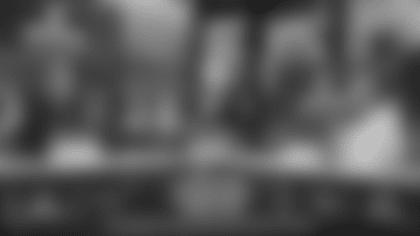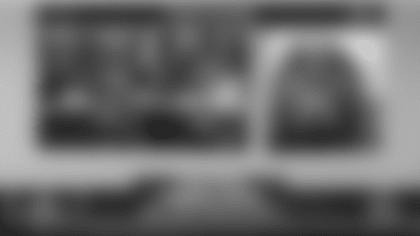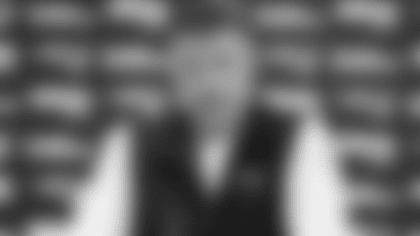Patriots head coach Bill Belichick, defensive coordinator Matt Patricia and offensive coordinator Josh McDaniels address the media during their conference calls on Monday, January 2, 2017.
[wysifield-embeddedaudio|eid="514616"|type="embeddedaudio"|view_mode="full"]BILL BELICHICK, HEAD COACH
Q: How do you feel both the players and the coaching staff have done this year in dealing with some adverse situations and key guys missing from the lineup throughout the season?
BB: I thought the players and the coaching staff have both done a great job this year of being focused and looking just at what's in front of us, that next game, not getting caught up in other distractions or things that we really don't have any control over. They've happened in the past or they're too far down the road in the future to deal with. The players have been really good on that. The coaching staff has been good on it, too. There are always things from week to week from a coaching standpoint that you have to make adjustments on, personnel things, or it could be a number of issues. But whatever they are, that's part of coaching, is being able to adapt and improve and make adjustments and I think our coaching staff has done a very good job of that.
Q: What have you learned over the years about the process of coordinators on your staff being allowed the opportunity to pursue other coaching positions but still managing their time well and remaining focused on the upcoming opponent?
BB: Well, every situation is different so they're all unique. I'd say in the end the most important thing is for this team to do what's best for this team and balance that with some of the other things we have to balance. We'll comply with everything we have to comply with in the league rules. We'll take it case-by-case.
Q: Has anyone reached out to you regarding the future of Josh McDaniels, Matt Patricia or Nick Caserio?
BB: Yeah, I wouldn't have any comment on that.
Q: You built a 20-0 lead early in the first half. What adjustments did you see them make that allowed them to get back in the game and what did you do to counter those adjustments?
BB: I don't really think there were a lot of, I would say, major adjustments. There were some plays that we hit through the course of the game, they hit through the course of the game, but I don't think this was a game where there were major shifts in strategy.
Q: What does it say about the reputation your coaching staff has built that they continue to draw interest each year for head coaching vacancies?
BB: I think I've said many times this year that I think our coaching staff does a good job. Collectively they work hard. They're well-prepared. They do a lot of extra things and they're very committed to what we ask them to do.
Q: What has Elandon Roberts done over the past two games to earn more playing time?
BB: Well, I think Elandon [Roberts] has had a pretty consistent year for us. Some of his playtime is a function of personnel matchups and what defensive grouping we have on the field, and also to some extent his availability and the availability of other players at his position. He played a lot in the Seattle game, played a lot in the Cincinnati game, had other games like Buffalo and Cleveland. The last couple he's played but not as much in other games. Some of that is circumstantial. The bottom line for him is he does a good job. He's a productive player. He works very hard. Football is really important to him. He cares a lot about it. He works hard to get things right and to do what he's asked to do. He's a great teammate, good communicator. He's improved a lot over the course of the year so he's done a good job for us.
Q: Your offense set an NFL record by only throwing two interceptions all season. What does that record say about your quarterback play and how do you feel the production has been from that position throughout the year?
BB: Well, I think that that's certainly [what] we always strive for, is good ball-security. In particular when you throw it a decent amount there are things that can go wrong that you have to try to avoid. I think there are a lot of people that deserve a lot of credit for that. It starts with the quarterbacks but the offensive line and the receivers, which includes the tight end and the backs. We've all seen a lot of interceptions occur from quarterbacks as they're throwing, balls getting tipped up in the air, receivers dropping the ball or going off of their hands for interceptions, things like that. It's not just the quarterback but it's the receivers getting open, it's the lineman in pass protection, it's the receivers catching the ball, it's the quarterback making good throws and good decisions, but it's all part of the team execution of the play and if it's good, then there's a pretty good chance you're not going to turn the ball over. And if any part of that is bad then you're getting into risky situations and probably eventually it's going to get you. I think our coaching staff has done a real good job of that and the execution level of the team offensively has been a big part of that as well. Certainly at the quarterback positon – I'm not taking anything away from that – but all of the other positons as well. As I said, we've all seen a lot of interceptions that you wouldn't put on the quarterback that were kind of caused or the result of something else that happened so avoiding those; that's all part of it, too.
Q: What did you see from Malcom Brown in the game yesterday as well as in his preparation last week leading up to the game?
BB: Well, last week in the Jets game, I think that was the lowest amount of plays that he's played, percentage of plays. I mean the number of plays is really a function of how many plays they run, so we have some say in that but we don't really control that. But I would say from a percentage basis that he's kind of in the same range for the most part every week. Somewhere in that, I don't know, 40 to 60 percent range. Maybe a couple a little higher, or a couple a little lower but that's basically where it is. Some of that is fluctuation that could be, again, their personnel situation, the defensive grouping that we're in or what have you. I think it's been pretty consistent other than the Jet game was the lowest percentage and I think probably the lowest number of plays that he's played in this year.
Q: How much of the fluctuation of Malcom Brown's playing time is a result of the work that Vincent Valentine has done to earn more playing time for himself?
BB: Well, I think in Vincent [Valentine]'s case he's definitely a player that's improving and has had an opportunity to with more play time get better at some things. But I think overall, again, if you take the Jets game out of it I'd say other than those games that he missed there, I don't know, before the bye week and it's not the same for every game. I mean I'm not saying that, but I'd say it's within a range. Those two guys, or those three players have kind of been a three-for-two rotation. [Alan] Branch has played the most and Malcom [Brown]'s played the second most and Vincent's played the least. Part of that was the games that he missed, but he would've probably had the least number of plays anyways. I'd say they all play a significant number of plays. It's not like they're in there for two plays. They all contribute. We've had certainly good plays and good results with any of the combination of the two of them in the game. There have been on a few very rare occasions all three of them in the game at the same time. There are some occasions where there's only one of them in the game. For the most part two of those three guys are on the field. I'd say we've had in the same range of success or not success with all combinations. We're confident in whoever's out there.
Q: What are your thoughts on the importance of downfield blocking and ball-security in regards to making yards after the catch?
BB: Well, there's nothing more important than ball-security. So we don't want to sacrifice trying to make a couple of extra yards for getting it knocked out of our hands. So there's definitely a balance there between open-field running and trying to be creative in the open-field and making people miss and gaining extra yards and all of that combined with not taking care of the ball. Ball-security is number one, but you know, our skill players do a good job of running with the ball. We've statistically been pretty high in that category the entire season and every once in a while you get a long catch-and-run play like the one we had yesterday. I'm sure every team has a couple of those along the way. It's really all of the other little – I won't say little – but a few yards 'here', a few yards 'there', a five-yard play goes for 10, a six-yard play that goes for 11, whatever it is. Those yards pile up and I think our skill players do a good job of running with the ball. They have a combination of power with somebody like Marty [Martellus Bennett] or LeGarrette [Blount], and then they have the combination of quickness and speed with players like James White, and Julian [Edelman], Danny [Amendola]. Chris [Hogan] has caught the most deep balls for us so a couple of those he's been behind the defense, but it's a combination of things. In the end they all have pretty much found a way to be productive with the ball in their hands and that's really what the job of the skill players is, is to get the yards that are there on the play through proper spacing, or following the blocking, or whatever the play happens to be. A certain amount of yardage that should be there if the play is executed properly and then the extra yardage comes from what the player can do with the ball when he gets it in his hands after he has first contact in a running play, or catches a pass and then is able to avoid or break tackles to create extra yardage. But ball-security trumps all of that. There's nothing more important than taking care of the ball.
[wysifield-embeddedaudio|eid="514621"|type="embeddedaudio"|view_mode="full"]MATT PATRICIA, DEFENSIVE COORDINATOR
Q: What are your thoughts on the way Bill Belichick and the front office staff is able to identify talent and incorporate newly acquired players like Eric Rowe and Kyle Van Noy into your system so well?
MP: Yeah, I think it's obviously – they do a tremendous job of understanding the players that we acquire and how they would fit into the defense or the offense or whatever it is that we try to run. Coach [Bill] Belichick and Nick Caserio do a great job of understanding. Nick does a great job of understanding what we're trying to do, how we're trying to play, the players that do a great job within our system. I think it helps them to go out and identify players that maybe they see, whatever that process is, that could help us and fit into whatever it is at that point in the year that we either need, or the direction we're heading as a particular group or defense or position-specific responsibility. It definitely helps. It's a great asset to us defensively, of course, if we can get guys that are kind of targeted, that they've targeted, that come in and have an idea of what they can do, and then we can put them in there and try to progress them through the process and see how it goes.
Q: As you, Josh McDaniels and Nick Caserio have all been around for a long time, to what degree does continuity help in your midseason and offseason acquisitions when new players come in and are trying to learn the system?
MP: Yeah, I think there's a good mix of that, of all of it really, to be honest with you. Coach [Bill] Belichick does a great job with the staff and putting everybody in place and giving everybody their strengths and weaknesses. Certainly, there are members of us that have been around each other for a while. It's great to have that kind of background and history and understanding of what we're trying to do, but every year coaches come in just like players, and things change or whatever the case is. That happens every year. I think it's just getting everybody in the same direction as quick as possible. That really kind of helps us moving forward. It's good. We have a great group of guys here that we work with everyday whether it's on the personnel side or the coaching side; it's the same as with the players. I think everyone just kind of understands we've all got a job to do and we're just trying to do it to the best of our ability. Certainly, it's great when you work with people, I'm very fortunate to have Josh [McDaniels] on the other side of the ball and Nick [Caserio] and guys that I've worked with for a long time. It's obviously great from that standpoint and I'm very appreciative of that. It's the same with the new guys that come in, I mean, we've got great guys here that we work with.
*Q: What do you attribute the defense's spike in forcing turnovers to? *
MP: I think number one, I attribute it to the players. Those are the guys that are out there trying to work extremely hard to get the turnovers and to put themselves in position to take advantage of it. I think it's something that we certainly, going back to day one, I would say in the spring we're always trying to work on tackling and turnovers and the fundamentals of the game from that standpoint. Sometimes, I think like we had talked about after the San Francisco game where we had the ball out quite a bit, it didn't necessarily bounce our way that game, and then we just kind of – sometimes it just starts happening and guys take advantage of those opportunities, maybe a little bit better, or there's just a little bit more attention to detail or whatever the case may be or just some little things that maybe push it in the right direction. It's something that obviously is critical for us that we just have to keep trying to do to the best of our ability to get the ball out and get it back to our offense as much as we can. It's something that we work really hard on. Sometimes it just starts happening. Guys start – it catches fire a little bit and guys are able to kind of stay after it. It's something that we've been trying to do all year and really take advantage of those opportunities that we have. We've probably just done a better job of it, but I think you've just got to give credit to the players.
Q: It came out on the broadcast yesterday that everyone calls Trey Flowers, "Technique." Where did that nickname come from and what does it say about him?
MP: Technique, no that's the first time I've heard that one. That's good. I would assume that – Trey [Flowers] just does a great job of playing the fundamentals the way that we want him to. He's extremely long. He's got great leverage. He does a good job with his hands, and he's just, I think he's a guy that really tries to improve himself. He studies very hard, really tries to do the things the way that we want them done. He understands the scheme. He does a great job of communicating too at the front, at the line of scrimmage. He's a guy that's just really kind of accepted a bunch of different roles and has really tried to excel at all of them and just tried to improve every day. He's great. He's a true professional that comes in, works hard and studies; really pays attention and takes great notes. Again, from the fundamentals and the technique standpoint, I think he's really learned to try to do it to the best of his ability the way that we need it done. That's a good one, I'll have to find out about it though.
Q: What happened on the Kenny Stills touchdown with Kyle Van Noy as it looked like there may have been a little miscommunication? And after that series, it seemed like the defense did a good job of taking away the under route from the Dolphins, can you address that as well?
MP: Sure, there were probably quite a few things in the game that when we go back through and we look at that we've got to improve on and we've got to get better on. Certainly the touchdowns, those situations that come up, we've got to try to get them in better position, and I've got to do a better job of getting those guys prepared for some of those. There were some good plays in there that Miami ran and took advantage of some things that they saw, so we've got to do a better job there in that situation. I think the guys are trying to work and trying to communicate on the field to take away some of those things or some of the problems that we're getting. I think they did a great job of understanding where the game was and how Miami was trying to attack us. I think with the underneath stuff they really did a good job of driving on everything and reading the quarterback and technique and some better thing closer to the line of scrimmage than maybe we had at some points during the game. It's just kind of a combination of, 'Are you doing things well at the line of scrimmage because it's a shorter game, or are you doing things well in the deeper part of the field?' Some of the coverages that we were using to try take away some different things, and then obviously, on that side of the ball those guys did a great job of trying to attack us too, which Coach [Adam] Gase does a great job of game planning week in and week out. He does a great job against us. He has a great background, he worked with Josh [McDaniels] for quite a while, so kind of that philosophy and mentally of going after teams, he does a really good job with that. They had a really good play there, but I did think the guys responded well and really tried to zero in on exactly what they were doing at that point and kind of go after it from there
Q: It's been reported that you are an interview target for the Los Angeles Rams. Have you heard anything from the Rams or from any other club as it relates to their head coaching vacancies?
MP: I think Coach [Belichick] addressed that. I haven't heard anything. We're just kind of working on yesterday's game and getting ready here for moving forward. I know there is a process in place with that that the league follows, but for myself right now, I'm just really kind of focused on what we're doing right now as a team and everything moving forward. I'm just in a normal Monday routine which is great for me.
Q: As you've been through this in the past, what have you learned about potentially interviewing for another job with handling your normal everyday routine and focusing on the task at hand as it relates to preparing for postseason play?
MP: I think that process last year is a great process to go through just as a young coach and something that was extremely new to me in learning about different organizations in the league and how they work and how they're structured and kind of the football ins and outs from maybe another different side that you see, maybe don't study and don't look at, but there's a whole other aspect to the organization how everything is run. That was a great learning experience from that standpoint. You try to, like everything, dive into it and learn as much as you can about it. That was pretty neat, pretty interesting from that standpoint. I think the balance of it is like anything, you try to balance everything. As far as what you're doing, you just understand what [the] priority [is], and the priority is always going to be, above everything else, what this season is about, what we're about here and trying to win and moving forward from the next game that we have to play, which is the most important thing. Nothing gets put above that, that's the most important thing that we have to focus on. We have to focus on all of our detail and this week it will be obviously just kind of pushing forward. That's always the most important thing. Everyone is working so hard right now, you never lose the task at hand.
[wysifield-embeddedaudio|eid="514626"|type="embeddedaudio"|view_mode="full"]JOSH MCDANIELS, OFFENSIVE COORDINATOR
Q: What can you tell us about any of the reports of your candidacy for some of the head coach openings around the league?
JM: Really nothing. I've just been working at creating the film here and getting everything nailed down for the Miami deal. I know there's a process in place and we've gone through that before but at this point I have nothing to add or comment on.
Q: What were your thoughts on Michael Floyd's contributions in the game yesterday?
JM: I think Mike [Michael Floyd]'s really worked hard to acclimate himself to our offense and get ready to go. We played him quite a few snaps yesterday just a couple of weeks after being here. He moved around. He didn't play the same spot the whole time, which again, is a credit to him and the work that he's put in. I think that starts with Coach [Chad] O'Shea. Chad does a tremendous job of preparing those guys, and really teaching them, and talking through their roles in the game plan, and getting them ready to execute the detail that we ask our guys to execute with. Jacoby [Brissett] spent plenty of time with him this week when he had some chances to do that, too. But ultimately it comes back to Michael. He's putting the work in. He made some really critical plays for us, made a big block on Julian [Edelman]'s touchdown. He's a physical guy, a big guy, big target, catches the ball with his hands. Like I said, his attitude has been great. He's working extremely hard and he certainly made some plays yesterday that helped us win some critical situations in the game and made some big plays.
Q: Your offense set a record by only throwing two interceptions all year. Is there a fine line between balancing risk and reward when you are calling a play and how have you managed that balance this season to help set that record?
JM: Well, I think there's always a risk-reward element in our game depending on what you're trying to do, and I think you have to take that into consideration. I think that statistic or just more importantly taking care of the football is really a team statistic. I know the quarterbacks are the ones throwing it, but again, there are a lot of turnovers in this league that are a result of bobbled passes, or tipped balls, or what have you. In our situation I think, again, that goes to catching the ball cleanly, running good routes, being open when the quarterback wants to throw you the ball, the offensive line getting the rushers hands down, not allowing a bunch of pressure right in his face as he's trying to deliver the football accurately and then the quarterbacks decision making; ultimately good decision making and the ability to do that under pressure in a game with good pass rushers, good coverage players around. It comes down to understanding how valuable taking care of the football is and being able to make great decisions under pressure in a split-second. I think our team values the football. We talk about how important that is to winning each week. Again, the credit goes to the players. They're the ones out there that execute and do the things necessary to win. Again, they've done a nice job of that this year in the passing game, for sure.
Q: What has Tom Brady done to improve his ball-security this late in his career and why is ball-security such a critical component of your offense?
JM: I think he's always been very good at it. I think, you know again, our awareness of it, understanding and studying the ways that other people turn the ball over. That's always an important facet of your preparation and he's definitely in-tune to that. He's aware of the different skill levels and talents of the defenders that we're throwing against. Again, also it comes down to experience and understanding what you might be able to do versus what's not a good idea. Sometimes you've got people that are rushing near you and there's a clock and a feeling that you need to get the ball out. Other times you want to stand in there and try to make some plays if you have more protection and what have you. Again, I think this is a team thing. He's been protected very well. I think our guys try to do a good job of creating separation and getting open and providing him the opportunity to throw the ball. He's made a lot of really smart decisions about when to take a chance and when not to. But again, I think that's something we talk a lot about each week. In terms of why that's such an important statistic, I mean if you have possession of the football then you have a chance to score and put points on the board, and ultimately that's how you win. If you lose possession of it or you give it away then the other team is going to have more chances, better field positon, which ultimately leads to points on the scoreboard for them. There's nothing more important than us trying to end every series with a kick, whether that be a punt, or an extra point, or a field goal. I think our team really values the ball and understands the value in taking care of it each possession and on each play.
Q: Can you quantify what Dante Scarnecchia has meant to the team this year in addition to some of the things he's brought to the coaches' room along with the game plan and offensive line?
JM: Dante [Scarnecchia] is a tremendous, tremendous asset, a tremendous, tremendous coach. He's a great teacher. He builds tremendous continuity among the guys that play for him. He really does a great job of getting them to understand how to communicate with each other and work with one another because ultimately, five guys need to do a good job of working with one another to do their jobs on the offensive line, and he's done a great job of that. He has them prepared and ready to practice each day so that they can make progress and improve, and then has them ultimately prepared and ready to play on game day which is again, that's our one day a week that we have an opportunity to go out there and really perform. He's been a tremendous mentor of mine and he's certainly made a huge difference and impact on our group up front and on our offense and on our team. I don't think his value can be understated. He's tremendous and we love having him here and it's our privilege to have a chance to work with him.
Q: What's it like just having Dante Scarnecchia around again after he was gone for two years?
JM: It's – again, for me, I had an opportunity to work with him when I was here the first time and then when I came back briefly. He enjoyed whatever he had an opportunity to do when he was briefly retired. He loves the game of football, he loves working. He's in extremely early every morning and does everything he can to help us prepare for the day, for the opponent, to get his guys to improve and make progress, and I think that it rubs off on everybody. Like I said, he's been extremely effective in all the things that he's responsible for and he makes us all better.
Q: Have you seen any changes that Julian Edelman has made this year on or off the field that have allowed him to remain healthy and remain an important option for your offense?
JM: Julian [Edelman] has always worked extremely hard. He's, again, he cares deeply about helping our team win. He does a lot to take care of his body from what he does to prepare for each day to how he takes care and gets treatment afterward. He tries to do the right things relative to his diet and sleep and all the rest of it. He's always done those things. I think sometimes in our game, you've got to have some good fortune in terms of health. It's a physical game, it's a contact sport. There are guys that take big hits and sometimes have to miss time and get healthy, but he's done everything we've asked him to do in terms of his role on offense. He's been a really productive player for us, and he's been there. He's been out there and available, which is ultimately the most important thing because if you're not out there, it's hard to do much. He deserves a lot of credit for keeping himself in good condition, staying healthy, and doing all the things necessary to make sure that he's out there to give ourselves an opportunity to use him and have him help our team win.





































